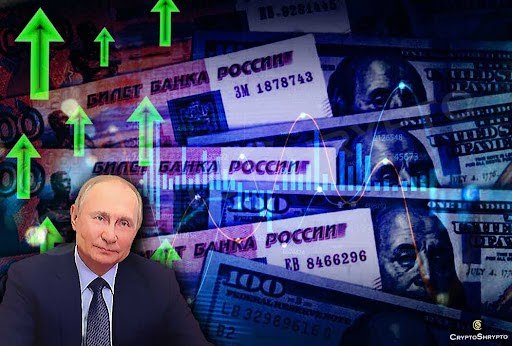The financial sanctions on Russia seem to have less of an impact on the transcontinental nation than the Western media has represented in recent months. On Monday, the exchange rate between the Russian ruble and the U.S. dollar reached its highest level since 2015. Numerous academics and others have said that Russia’s financial records are falsified and that the ruble’s strength is mostly an illusion. The majority of the ruble’s power, according to one YouTuber, derives from manipulation.
Jake Broe, a Youtuber, informed his 146,000 viewers that “the Russian economy is now failing, inflation is high, unemployment is rising, salaries are falling, and the Russian economy’s gross domestic product is collapsing.” However, Broe’s arguments could also be applied to the United States, given that the American economy appears to be heading toward a recession, inflation is at its highest level in 40 years, jobless claims in the U.S. have increased as productivity has decreased, and the U.S. economy’s GDP shrank significantly in the first quarter of 2022.
According to Broe, the Russian government and central bank are manipulating the economy, making the currency seem robust. However, it is possible that U.S. lawmakers and the Federal Reserve may also be charged with manipulation and dissemination of false information. Other assessments that do not rely on Broe’s biassed talking points reveal that sanctions on Russia have been a catastrophic failure. The Russian oil embargo is ineffective, according to a research released by armstrongeconomics.com, and Putin is now selling more oil at a higher price point.
In addition, Russia has obscured its financial transactions by announcing that monthly government expenditure numbers would no longer be revealed. The Russian Finance Ministry informed the press that the government must “minimise the danger of new sanctions.” Bitcoin.com revealed two weeks ago that various nations have been importing oil from the Russian Federation in defiance of Western sanctions. According to reports, India obtains crude oil from Russia, refines it, and then sells it to Europe at a profit.
China has also started acquiring oil from Russia, and a number of Chinese oil refineries are compelled to do so. The biggest Italian refinery, ISAB, has been forced to import crude oil from Russia since banks have ceased extending credit to the firm. China has been the biggest single purchaser of Russian oil since 2021, and data indicates that the nation gets an average of 1.6 million barrels per day from Russia. Meanwhile, oil is growing scarcer across Europe, and there are predictions that the United Kingdom might see widespread blackouts. The Economist asserts that Europe is experiencing a “serious energy price shock.”




